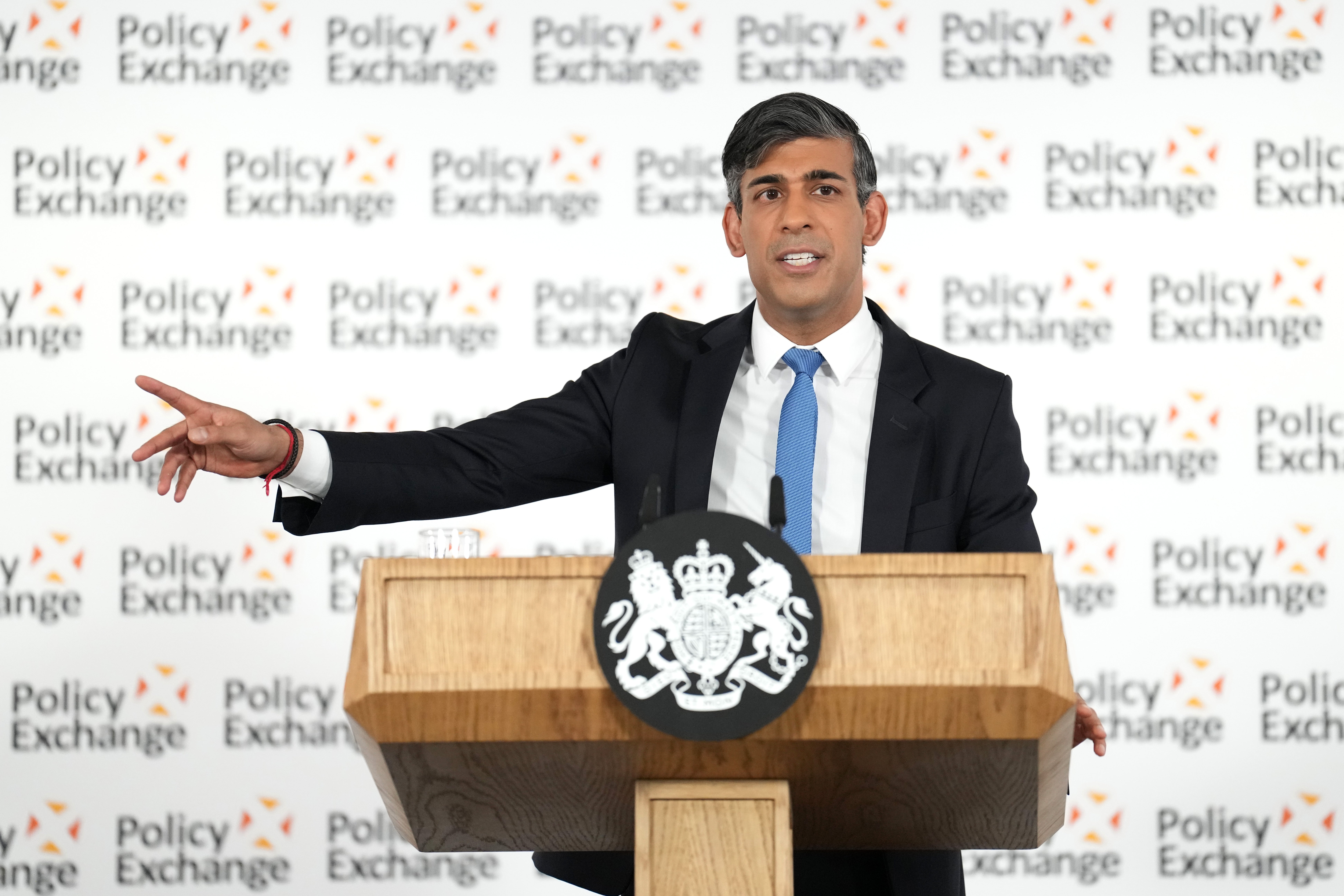Rishi Sunak presses the reset on defence… and misses
In a long-awaited speech, the prime minister highlighted the existential threat posed by Russia, Iran, North Korea and China – but his awkward new term, the ‘axis of authoritarian states’, shows that this is not a battlefield on which our technocrat leader feels at home, says Joe Murphy


True story: 11 years ago, one of David Cameron’s inner circle confided to me over a drink at 30,000ft that the then-prime minister had cracked the Putin problem.
Alone among European leaders, he understood that the Russian bear just wanted respect. Cameron had cosied up, and they were now bros. At one meeting, Putin flattered Cameron with a giant cake shaped like the Houses of Parliament. At another, Cameron even chucked aside his yellow briefing cards because the pair were getting on so well. A year later, Putin annexed Crimea.
Yes, this is all true. The current foreign secretary fell for Mr Novichok’s flummery just as Emmanuel Macron and others have done. Just as they convinced themselves the Chinese would be content to work all hours making cheap clothes and computers in return for our luxury cars.
Let’s just say that the Conservatives have not always appeared entirely razor-sharp when it comes to defending the realm over recent years.
Which is why Rishi Sunak needed to press the reset button by delivering what was trailed as “a major set-piece speech” about threats clouding the global horizon.
Except that it didn’t look or sound major at all. The PM stood in front of a football wall advertising his hosts, the Policy Exchange think tank, a highly political organisation once known as boot camp for Tory MPs. It looked more like a trade conference in Walsall than an attempt to reshape the world order.
Advance briefings focused on a scary “axis of authoritarian states”. If that slogan sounded weak, well, the reality was more a party election broadcast on the theme of “who do you trust to keep you safe?”
Big speeches on defence and security matter. Tony Blair’s Chicago address in 1999 set out an interventionist doctrine that foreshadowed the Iraq invasion. Theresa May flew to a Republican Party conference to say the days of Britain and the US trying “to remake the world in our own image are over”. Boris Johnson addressed the Ukraine parliament to declare: “Slava Ukraini!”.
But this wasn’t one of those. As the PM read his script in that weird sing-song voice he adopts when he strays from his beloved spreadsheets, it sounded like an election warm-up. One minute he was intoning: “War has returned to Europe, with our Nato allies warning that if Putin succeeds in Ukraine, they might be next.” Next minute he was playing culture wars about “gender activists hijacking children’s sex education”.
The game was given away by his banging on about the coming election choice, which would be fought on “the future versus the past”. This was confusing: was he Mr Change or Mr Continuity Safety? And is it wise to talk about the past when your party has held power for 14 years that resemble a TikTok reel of car crashes on repeat?
It was also clear from the attacks on “utterly unprincipled” Keir Starmer who “has gone from embracing Jeremy Corbyn to embracing Natalie Elphicke”.
Afterwards, he answered questions. The first, from The Sun, which prides itself as “the paper that supports our boys”, referenced defence spending. Hadn’t he left all this a bit late?
The BBC wanted to know if his pitch was better the devil you know. “In a word, yes,” said Sunak, back to being the Continuity PM.
“Who can you trust to keep you safe in that more dangerous world?” His answer was: “Well, you can trust me.” However, recent polls suggest that Labour’s shadow defence secretary John Healy has succeeded in wiping out the Tories’ traditional lead on defence, amid discontent in military circles about shortages of kit and manpower. It won’t be possible for the Tories to rerun their 1987 election poster of a soldier with his arms up in surrender, under the headline “Labour’s policy on arms”.
Ironically, defence sources tell me that current spending might actually have reached the undated 2.5 per cent target that Sunak recently set out. But only because some budgets have slipped out of control, with purse strings having to tighten again.
Armed forces do not go bust like a steelworks, but they can go into decline, which has happened to the army and might happen next to the navy.
The speech Sunak should have given, about how Britain is stepping up to the global threats with statecraft and the strength of its economy and values, was actually made last week in Washington DC by the chief of the defence staff, Admiral Sir Tony Radakin. Sober and devoid of party games, Radakin spelt out the “combative” behaviour of global enemies but also a new willingness in the West to unite and engage to “see it through”.
While some prime ministers, like Blair and Cameron, are genuine enthusiasts for the military, Sunak seems more like Gordon Brown, who didn’t really get it. If Sunak really wanted to change that perception, he could have flown to a major capital or at least a military think tank. He could, for example, have crossed the road to Lancaster House where the First Sea Lord’s sea power conference is being held on Tuesday and Wednesday.
But that would have been a non-political platform. And this technocratic prime minister can’t stop trying to win at politics, a battlefield he really doesn’t shine on.
Join our commenting forum
Join thought-provoking conversations, follow other Independent readers and see their replies
Comments
Bookmark popover
Removed from bookmarks